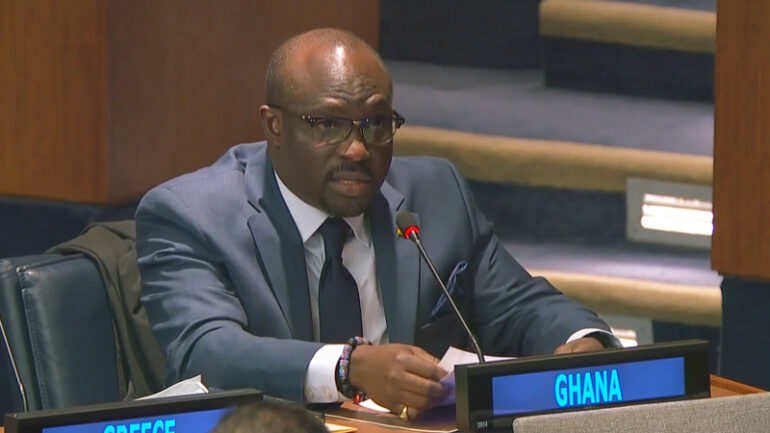General Debate of the First Session of the Ad Hoc Committee on Cybercrime

- Posted by admin
- Posted in Statement & Remarks
Ambassador Harold Agyeman
Permanent Representative
Ghana Permanent Mission to the United Nations
February 28, 2022, Security Council Chamber
New York City
DURING THE GENERAL DEBATE OF THE FIRST SESSION OF THE
AD HOC COMMITTEE TO ELABORATE A COMPREHENSIVE INTERNATIONAL
CONVENTION ON COUNTERING THE USE OF INFORMATION AND COMMUNICATIONS
TECHNOLOGIES FOR CRIMINAL PURPOSES FIRST SESSION NEW YORK,
28TH FEBRUARY
Madam Chair
Excellencies,
Distinguished Delegates,
At the outset, let me join previous speakers in thanking you, Madam Chair, for the valiant efforts you have made in convening this first session of the Ad hoc Working Group to elaborate a global convention on countering the use of information and communications technologies for criminal purposes. Due to the positive impact technologies continue to make in stimulating jobs,
improving productivity, and accelerating inclusive growth for sustainable development, there is an increased need to facilitate its orderly growth and development and protect it from criminal elements.
At the national level, the government of Ghana, keenly aware of the growth path required for the country’s development, through an enhanced utilisation of ICT in many national processes, has acted to strengthen its ICT eco-system by reviewing its National Cybersecurity Policy and Strategy and passing a landmark Cybersecurity Act in 2020. These proactive measures contributed to Ghana being ranked 3rd in Africa and 43rd globally on the International Telecommunication Union Global cybersecurity index. As of 2017, Ghana’s cybersecurity readiness was 32.6%, however at the end of 2020, Ghana stood at 86.69%.
We therefore welcome the consideration of a global convention to counter the use of ICT for criminal purposes and note that when well elaborated it would complement existing national, regional and international instruments for addressing the cybersecurity challenges of our time and enhancing the safety and security of the cyberspace. To name a few, such instruments include the UN Convention against Corruption (UNCAC) and the UN Convention against Transnational Organised Crime (UNTOC), the African Union Convention on Cyber Security and Personal Data Protection (Malabo) and the Convention on Cybercrime (Budapest Convention).
Madam Chair
Despite the progress being made in advancing technologies for our development, more needs to be done to improve cyber-safety in light of the increasing number of attacks being carried out using computer systems and data. In addition to these cyber-attacks, online exploitation of women, children, and recruitment of youth by terrorist networks as well as the propagation of hate speech
have had an insidious effect on the cyber ecosystem and crippling effects on individuals, economies, and nations as a whole. This session could therefore not have begun at a better time, especially with the advent of the COVID-19 pandemic, posing a significant threat to a myriad of economies that had to develop new ways to ensure continuity at individual, social and national levels. Ghana believes that meaningful progress can be made in the development of this novel convention, if a multi-stakeholder approach is adopted to allow for a fair and open process in the engagement of the private sector and civil society organisations. Furthermore, it is crucial that agreements reached are consensual and that the participation of Member States is on an equal basis.
Madam Chair,
As part of our contribution to shaping the discussion in the development of the convention, my delegation would like to share the following points on the scope, objectives and structure of the global convention:
a) First on the objectives, we believe the Convention will be most efficient if it seeks to harmonize substantive criminal law offences of State parties, enforce investigatory laws and procedural powers, promote cooperation between the private service providers and criminal justice authorities both at the national and international levels. It should also enhance international cooperation
amongst State parties to the broadest extent possible and promote Technical Assistance and Capacity Building in specialized areas like Cybercrime Investigation and the sharing of best practices to ensure successful prosecution.
b) Secondly on the scope, Ghana identifies that successful prosecution of cybercrime is a measure of mitigating threats to ICTs and their misuse thereof. Accordingly, the new draft Convention should harmonize national laws on cybercrime, improve investigatory powers and procedures, promote State sovereignty, and enhance international cooperation while protecting privacy
and other fundamental human rights. It should determine which type of acts constitute a criminal offence, cover cyber-dependent offences, together with cyber-enabled crimes where the use of a computer increases the scale, scope and speed of the offence. Furthermore, the scope should take into full consideration existing international instruments such as the Budapest Convention, the African Union Convention on Cybersecurity and Personal Data Protection and provide measures for sustainable capacity building and technical assistance.
c) Thirdly on the structure, we share the view that it should comprise a preamble, purpose of the treaty as well as standard definitions. Additionally, the following elements should form part of the structure: Substantive Law, Procedural Law, International Cooperation Mechanisms, Public-Private Sector Cooperation, Technical and Capacity Building Measures, as well as Conditions and Safeguards.
In conclusion Madam Chair, I wish to assure you of Ghana’s commitment to this process, and looks forward to progressive deliberations. The multibillion users of ICTs who are vulnerable to cybercrimes are waiting on us. Let us set the rules to protect each of them, no matter which part of the world they find themselves.
I thank you for your kind attention
